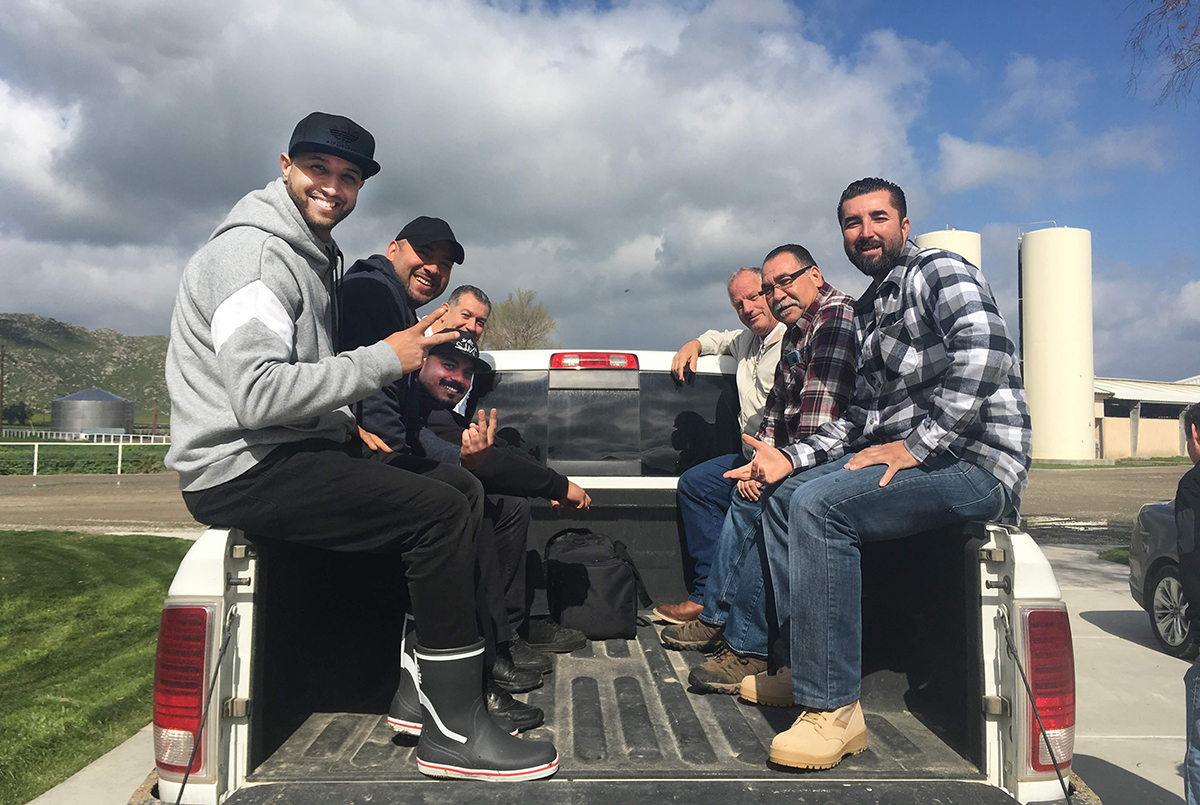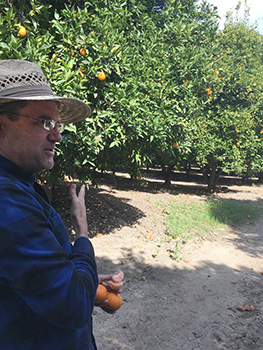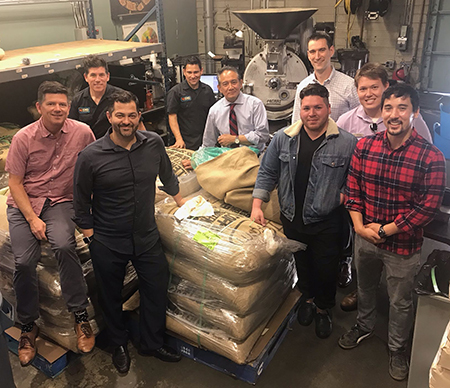Southern California Bon Appétiters Visit a Dairy, an Orange Grove, and a Roastery

Chefs pile into a Hollandia Dairy truck for a tour, clockwise from far left: Executive Chef Amine Boussaksou (Biola University), Executive Sous Chef Allan Gonzales, Regional Forager Chito Rodriguez, Executive Chef Alberto Gonzales (Pacific Café), dairy owner Arie de Jong, Executive Chef Paul Baca (Claremont McKenna College), and Regional Executive Chef Peter Alfaro
This spring and early summer, I organized several field trips to Farm to Fork vendors for Southern California Bon Appétit teams who wanted to learn more about their practices and how they could be more effective partners.
Hoofing It Over to Hollandia
In 2013, Bon Appétit created a new subset for its Farm to Fork program called Midsize Humane. The goal was to recognize regional producers who were too big to qualify for Farm to Fork (more than $5 million in annual sales) yet still far smaller than the national behemoths in their category, and whose third party–certified animal welfare practices deserved the company’s purchasing support. Hollandia Dairy in San Marcos, CA, is one of those special vendors.
Recently Regional Forager Chito Rodriguez, Regional Executive Chef Peter Alfaro, Executive Chef Amine Boussaksou (Biola University), Executive Chef Paul Baca and Sous Chef Miguel Valdez (Claremont McKenna College), Executive Sous Chef Allan Gonzales and Resident District Manager Jon Webster, and Executive Chef Alberto Gonzales (Pacific Café) joined me on a visit to Hollandia, which supplies their Bon Appétit locations.
The name Hollandia pays homage to the Dutch roots of the de Jong family, whose family started the business in 1949. One of the oldest independent dairy producers and distributors in California, Hollandia is Certified Humane by Humane Farm Animal Care. Farm owner Arie de Jong, his son/manager, Josh, and Sales Manager Rick Struble gave us a full tour of their 180-acre property in San Jacinto. After loading into a pickup truck, they first drove through heaps of local agricultural byproducts used for animal feed: distillers’ grain, citrus, carrots, and almond, cotton, and soy hulls. Hollandia supplements the feed with rye, corn, and wheat grown nearby, and hay is made from Imperial Valley grass. (Manure from their cows goes back to the Imperial Valley as fertilizer.)
In addition to feed, Hollandia closes the loop on electricity use and production: Their field of solar panels covers all the energy needs on the farm. Especially important are the fans and misters that keep the cows cool in the summer.
In recent times, the hardships facing American dairy farmers have received increased attention. Hollandia is not immune to this, though Josh said dairy closures in California have not been as severe as those in the Midwest and Northeast. In addition to their fluid milk operation, Hollandia sells cream to an ice cream producer through a cooperative, and is exploring the possibility of raising cattle for beef in order to diversify and bring in extra revenue.
Old Grove Orange, The O.G. Citrus Grower
District Manager Brett Martin joined Chito, Peter, Jon, and me on a drive to Old Grove Orange, a recently reenrolled Farm to Fork vendor in Redlands, CA, which grows oranges, mandarins, and grapefruit as well as kiwi, figs, and vegetables.

Old Grove Orange owner Bob Knight talks about his Gold Nugget mandarins
As we strolled through the trees, Old Grove owner Bob Knight told us how he grew up on a nearby orange farm, how the Inland Empire was once known as the Orange Empire, and how today some 2,500 acres of citrus are still cultivated in and around Redlands.
Bob sells all Old Grove Orange’s fruit to school districts and universities. He heads a cooperative of 11 other produce growers that share workers, distribution facilities, and a delivery truck, further strengthening Old Grove’s ability to serve larger buyers. Relationships with institutional buyers such as Bon Appétit allow producers to focus on growing the best crops, which Bob evidenced with samples of his delectable Gold Nugget mandarins and asparagus that he cut and shared during the tour.
Old Grove’s trees are tall, which is uncommon for oranges. Most growers in the region “hedge” and “top” their trees because new growth is thought to produce larger oranges. Bob prefers his smaller, sweeter fruit, adding that they fit better in a school lunchbox. There’s another reason Bob avoids trimming trees: Newer branches are preferred by the invasive sap-sucking Asian citrus psyllid. Pesticides are not an option, since Old Grove uses organic practices. On the flip side, Bob has a penchant for turning challenges into unique opportunities — he’s looking at agrotourism, building a wedding barn, renovating an old reservoir, and adding a play structure for future school field trips. Old Grove also collects manure from neighboring horse farms and turns it into compost, to the tune of 25 tons per week.
Cupping with Jones Coffee Roasters
Jones Coffee Roasters in Pasadena, CA, is one of several Farm to Fork vendors supplying Bon Appétit’s Southern California teams. Jon, a couple of Bon Appétiters from Biola University and other nearby university clients, and I stopped by for a coffee cupping and informational session.

Clockwise from front-left: Assistant Director of Operations Collin Rand (black shirt), Jones Coffee co-owners Larry and Chuck Jones, Jones Coffee Roaster Rafael Batiz, Jones Coffee Sales Manager Maurice Saldebar, Resident District Manager Jon Webster, Catering Director Leon Darley (Biola University), Assistant Catering Director Isaiah Kerkhoff (Biola University), and me
Chuck and Larry Jones started their eponymous roastery in 1994, but the Guatemalan coffee farm that inspired the business has been in the family for five generations. Named “Farm of the Two Marias” — an ode to the great-great grandmother and great-grandmother who cultivated the land and galvanized the community around coffee production — Finca dos Marias keeps the best beans in-house but also sells beans wholesale to other roasters. In addition to the flagship family brews, Jones Coffee sources globally from other producers who share their dedication to quality and community involvement.
The brothers led us through a cupping of seven coffees and a tour of the roastery, explaining how different regions, harvest methods, and roasting techniques coax out the best of each varietal. While some of their purchases are Certified Organic and/or Fair Trade, Jones Coffee prioritizes direct trade and producers who partner with the International Women’s Coffee Alliance. At the end of the day, their focus on quality and supporting rural communities is best met with a nuanced, systemic approach to sourcing; for this reason, the brothers expressed admiration for Bon Appétit’s new dual sustainable/local coffee commitment.
Chuck and Larry set up a tent at Whittier College during lunch the next day, offering cold-brew coffee, free mugs, and even a cornhole game for students to enjoy. This was a hit combination!